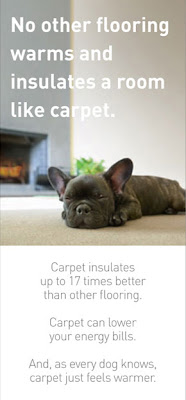The warm comfort that carpet provides is not just
your imagination. Unlike other types of flooring‚ carpet is a natural insulator‚
providing additional warmth in cold seasons (which we are approaching here in Massachusetts). The use of carpet in a wall–to–wall
application actually increases the R–value‚ or insulation level‚ of the carpet
area‚ potentially saving homeowners like you utility costs while reducing energy
use. The R value (thermal resistance) measures how much a material resists the
movement of heat through a ceiling‚ wall or floor in a building. The higher the
number‚ the more effective the insulation. Recently‚ tests carried out at the
Johns Manville Technical Center Thermal Labs‚ one of the most sophisticated
laboratories of its kind in the world‚ confirm carpet and pad significantly
increase R–value compared to other flooring materials.Results varied according
to the carpet’s construction‚ with heavier products generally providing higher
R–value. Carpets were tested with and without cushion‚ and the combination
maximized the R–value. Carpet really is warmer. Test results from the different
carpet constructions were compared to three hard surface products – ceramic
tile‚ laminate‚ and engineered hardwood – and the differences were dramatic:
- Carpet vs. engineered hardwood: (From 3 to 7 times the R–value.)
- Carpet vs. laminate: (From 4 to 8 times the R–value.)
- Carpet vs. ceramic tile: (From 8 to 17 times the R–value.)
Warm up your home this winter with National Carpet in Tyngsboro, MA! Remember, we also have NO sales tax when delivering or installing to New Hampshire!
We've recently installed new carpet in homes & businesses in Lowell, Chelmsford, Dracut, Westford, Tewksbury, Billerica, Andover, Methuen,
Shirley, Groton, Dunstable, Pepperell, Tyngsboro, Nashua, Hudson, Salem,
Merrimack, Manchester, and Pelham New Hampshire.


It is a very informative and useful post thanks it is good material to read this post increases my knowledge. Rugs vintage USA
ReplyDelete